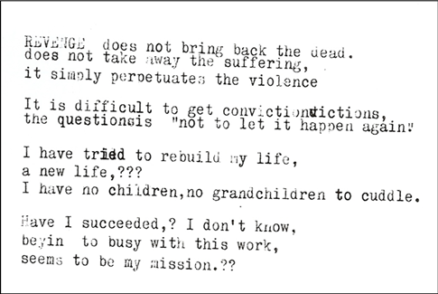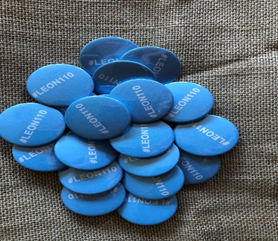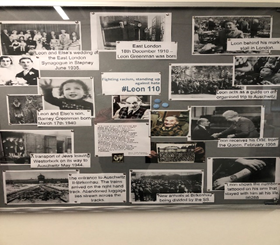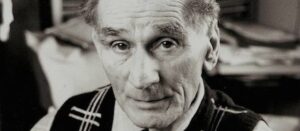A blog by the Centre’s Corey Soper and Nic Wetherall
To commemorate the 110th anniversary of Leon Greenman’s birth, we at UCL Centre for Holocaust Education launched #Leon110, a program which invited schools and their communities to reflect on Leon’s life, his legacy and his tireless work in Holocaust education and anti-fascist activism.
This work built on and resonated powerfully with the theme of this year’s Holocaust Memorial Day – to “Be a light in the darkness” by inviting young people to reflect on the importance of Leon’s work and the personal struggles he faced. You can learn about Leon Greenman’s life through visiting the exhibition at Jewish Museum London or by reading his memoir, An Englishman in Auschwitz.
As a stimulus, young people were offered for the first time an unfinished poem of Leon’s, found among his affects by our colleague Ruth-Anne Lenga, and invited to give the poem a title and to finish it with a final stanza (either as Leon, or in the form of the student’s personal and direct response to his doubt). In this poem, Leon grappled with the loss he had suffered, and his sense of purpose in busying himself with his zeal for Holocaust education. The constant questioning gives this fragmentary poem a pensive and thoughtful air, and you can see that the poem was produced in a single flurry of typing, indicating a ‘stream of consciousness’ which allows us an intimate glimpse into his mind.
It was a real pleasure for Centre colleagues to read the huge diversity of responses from across the country, and we are delighted to announce that we have selected ten awardees. We were also pleased to see so many entries from our Beacon School community – demonstrating the continuing importance of Holocaust education in those school networks. You can read each of the awardee entries on the right-hand side of the page.
Many entries reiterated Leon’s doubts and the bleak tone of his poem, such as the poem “Unaccomplished: For Now”, which focusses on that loneliness and loss with figurative language “Isolation has conquered my realm…the emptiness engulfs every breath…” This showed a real engagement with the long-term, life-long suffering that Leon experienced after the loss of his wife and child in Auschwitz-Birkenau. The entry ‘Stuck in the Past’ also dwelt on the doubts and frustrations expressed by Leon in his original poem, framing the whole poem to question the redemptive power of Leon’s sense of mission.
Other entries sought to answer Leon’s questions and doubts with a positive vision for the future, focussing on how Leon was a ‘light in the darkness’ through the transformative power of Holocaust education. ‘A Change Must Come’ is a punchy, passionate answer to Leon’s doubts which uses short declarative sentences to stridently answer Leon’s questions and reaffirm his message. The entry ‘Revenge is never right’ is a triumphant and proud response which recognises Leon’s contributions to Holocaust education and anti-racist activism. It’s final lines “I have come through hell and now /I am battling to terminate racism across the world” are a powerful call to action based on Leon’s experiences. Others meditated on the power of forgiveness, such as ‘My life, legacy and mission’ which lays out an impassioned argument for the personal comfort forgiveness can offer.
Some entrants made sophisticated use of poetic form in their responses. The entry ‘Convenience in Luxury’ subverts the typical form and structure of a sonnet, and even uses the Romantic language associated with the form, to create a powerful and hopeful testament on the impact of Leon’s life. We felt the final rhyming couplet “We shall always know, that as bleak as the past may be/ The music of the future sings in sweet harmony” was a powerful end to the doubts of Leon’s original poem. The poem ‘Doubts’ is framed as a response to Leon, reassuring him, making use of personal pronouns to give the poem the sense of a private message. Additionally, many entrants made powerful use of evocative imagery and figurative language. The poem ‘Revenge’ was a particularly good example of this, using language such as “the sleeping flames of hate” to express the dangers posed by racism and antisemitism. ‘Convenience is luxury’ also drew on evocative language to express a hopeful future, such as “…when the shadows fade and the sunrays sweeten.”
These entries showed a rich knowledge of Leon Greenman’s life story, and understood how the ‘darkness’ drew in for Leon and his family and the lasting legacy that shadow of trauma and memory cast. But students also found a real appreciation for the significance of his work as a ‘light in the darkness’. Through their responses, our awardees demonstrate that 110 years after Leon’s birth, and 76 years since the defeat of the Axis powers in Europe, young people remain passionate about learning this history, and combatting contemporary issues of racism and the threat posed by a resurgent far right. They are aware of the darkness that threatens our own times and recognise that we must remain vigilant in the face of hate, injustice and denial. Many entrants noted in their writing that they now felt a stronger personal drive to combat prejudice and hatred in their own communities, showing us that Leon’s legacy continues to empower and educate young people.
Thank you to all the student participants who entered – for your hard work, thoughtfulness, and creativity. We would also like to thank the teachers involved for taking the time to commemorate this anniversary in an extremely difficult time for the profession with numerous pressures being placed on teachers. Your commitment to your young people and to Holocaust education during this pandemic is inspiring. Teachers finding innovative, engaging and meaningful ways to teach about the Holocaust online, or approaches suitable for home-learning again proves the profession is providing a ‘light in the darkness’.
Within the COVID context, which continues to be difficult and challenging time for schools, we were unsure how willing, interested and able to engage with #Leon110 teachers, schools and young people would be. We were delighted when 43 teachers from schools across the country joined us of an online initiative launch in November, and that this translated into our formally receiving up to 5 entries from 19 Beacon or network partner schools.
In addition, a further 39 schools in our partnerships and Centre networks, Beacon or otherwise, chose to reflect on #Leon110 in other ways participated by delivering ‘live’ online and in school lessons, e-assemblies to mark the anniversary, art projects, displays, badges projects, film-making and so on.
Although unable to participate in the Year 8-9 poetry initiative, Royal Wootton Bassett Academy students at the Maddog Rugby (@MDSRugby) Academy were encouraged by Lewis Moody and coach Ryan Kirby to mark #Leon110. The Centre’s Nic Wetherall led an online session with the group and the boys responded with menti.com insights and went on to produce a short film.
At Oakmoor School, there was a display produced and a badges initiative to support raising awareness throughout the school community of the life and legacy of Leon Greenman.
Elsewhere, schools marked #Leon110 by drawing on his life and legacy as an opportunity to engage with #HMD2021. The Centre produced a stimulus case study and discussion card (Leon being one of our 7 life stories) and these were discussed during online tutor time or shared for home and community learning.
Will almost 60 schools and communities engaged in some way to mark #Leon110 we have continued the Centre’s mission to share the individual stories of Holocaust survivors (like Leon) and victims (like Else and Barney), embed knowledge and understanding of this most complex and challenging history so as teachers can equip young people to safeguard the future by studying the past and ensuring contemporary relevance is understood. It was a real pleasure read such thoughtful, insightful and creative student entries and we commend every student for taking the time to respond. It was a difficult task for us to identify our 10 awardees. These contributed to such a rewarding program and testimony to the light Leon has come to provide young people, who have been informed, inspired and empowered by him to fight racism and stand up to hate.
Programme Director, Ruth-Anne Lenga, said:
‘Moving, insightful, inspirational, powerful, compassionate – these are key words that describe the many poetic entries from students across the country who responded to UCL’s #Leon110 poetry challenge. Staff here at the Centre marvelled at the poet’s level of understanding of Leon’s trauma and his determination to live his survival fully in the fight against racism and hate. Thank you from the Centre and from me personally, a close friend and confidante of Leon. I know how deeply heartened he would have been by the young poets’ ability to understand something of his struggle.’
You can find out more about how the Centre support’s teachers to share Leon’s story and model our pedagogical principles via our short online CPD course: ‘Authentic Encounter with the Holocaust’.




